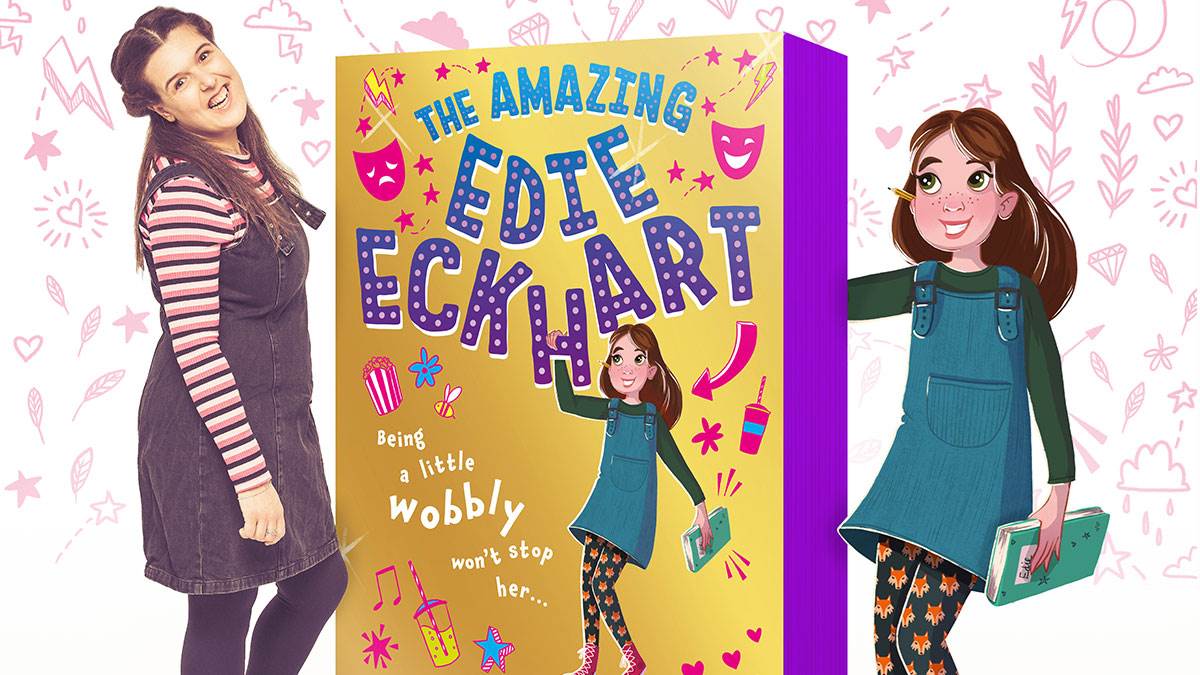Meet Edie Eckhart, comedian Rosie Jones' new children's character: 'People with disabilities absolutely deserve to be the hero of the story'
Published on: 02 December 2021
Edie Eckhart is funny, brave and brilliant, and just happens to have cerebral palsy. Rosie Jones tells us why she wanted to write this book, where the story mirrors her own life, and how reading is one of the most freeing things that you can do.

Has this book been something you’d been wanting to write for a long time?
You could say that! On my first day at primary school, we all had to sit in a circle and say what we wanted to be when we grew up. I said I wanted to be a children’s author. So this book has been more than 25 years in the making.
The book is written in a diary form. What made you choose this approach?
Good question! I like how accessible diaries are – they aren’t in big blocks of text, so you can dip in and out of them. Plus, diaries are often written quite quickly, so there’s not much time to polish them – and, for that reason, you could say they’re a "real" form of fiction? Unpolished and honest. And I like the reflection that goes into diaries – conversations with yourself, your own perception… It gives a lovely, personal view of someone and what they’re really like. And I really want people to love Edie, when they discover her – I know I do!
Have you always been an avid reader yourself?
YES. I loved books growing up and I was always a very fast reader. I could just open up a book and be transported to Narnia, Genovia, or even straight inside a gigantic peach.
Books take you places – anywhere – and that’s exciting and freeing and I can’t recommend it enough.
As you were growing up, did you find any protagonists who happened to be disabled?
Another good question! In a word – no. I read countless books growing up but, looking back, all of the characters were able-bodied. Despite reading hundreds of books, I never came across a main character who happened to be disabled. It was just a given that somebody like me would never be the hero of the story. I wanted to change that. People with disabilities are just like everybody else – we are funny, challenging, flawed, brilliant, courageous, stubborn, diverse and unique! And we absolutely deserve to be the hero of the story.
The title of the book refers to the “Amazing” Edie Eckhart – in what way would you say she is amazing?
I might be biased because I love Edie, but to me she’s AMAZING in lots of different ways – she’s funny, she’s brave, she’s a good friend, she gives things a go.
Would you agree that in a sense she is also quite ordinary, in that most of the things that preoccupy her are pretty much like any other 11 to 12 year olds?
Absolutely! And that was a point I was keen to make. She has the same worries, hopes and dreams of almost every other 11 to 12yr old. All the things that are important to them are important to her.
When I’m asked to sum up my book, I say ‘My book is about a brilliantly funny 11-year-old girl called Edie, who just happens to have cerebral palsy’.
What elements of your own personality comes through in Edie and in what ways is she very different from you?
The main character, Edie, has the same disability as me, and whilst this book isn’t autobiographical, a lot of what happens to her did happen, in some form, to me when I was younger. Edie, like me, has cerebral palsy, which affects her speech and her mobility. And as the title suggests, she is amazing. She never lets her disability hold her back, and growing up, my parents taught me I could be whoever I wanted to be.
Edie loves hanging out with her mates, going to the cinema, eating sausage rolls and looking after her little brother… apart from when he’s being annoying! People ask me if I’m Edie – we’re similar, but Edie is who I’d have liked to have been growing up. She’s more confident than I was, for sure. I’d have worshipped Edie if I’d known her at school, I think!
What were some of the key things you want to get across to young readers through the book?
I hope this book has a positive impact on how society views disability and sexuality. I hope it makes people more open and accepting of diversities, and I hope it teaches children that it doesn’t matter how you walk, or who you love, as long as you’re a good person. And if you’re true to yourself, you’re winning at life!
Topics: Bookmark, Disability, Mobility/wheelchair, Interview, Features





